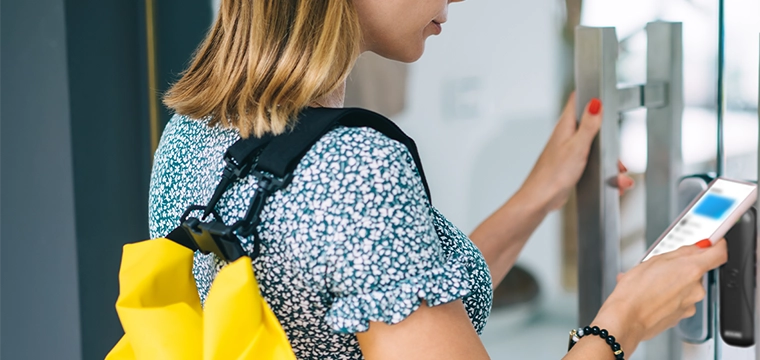Panel includes members from NACCU and NECUSA associations
The current state of campus access control was the focus of a joint panel discussion with members of the Northeast Colleges and Universities Security Association (NECUSA) and NACCU. Topics surrounded reporting structures, obstacles, investments, lockdowns, and plans for access control on campus.
Panelists included leading institutions in the Northeast:
John Ogle, NACCU’s Membership Experience and Education Director, moderated the event. Panelists provided their perspective on the topics below. Ideas from one of the speakers is highlighted following each topic.
The full session is time well spent, but the time codes for each topic are provided below if you want to skip to specific topics.
Meghan Rosenberg, Associate Director of OneCard & Parking Management Services, Babson College, Wellesley, MA
Our office falls directly under Public Safety, so I'm a direct report to the Chief of Police. We use C-Cure for our access control system, and we currently have magstripe and prox credentials.
All of our residential buildings are card access, and we are in the process of adding card readers to all exterior doors on our administrative buildings as well. We're hoping to wrap that up by January 2026. We are hoping also to transition to mobile credentials within the next two years.
Patricia Groeber, Associate Director of Public Safety, Rensselaer Polytechnic Institute (RPI), Troy, NY
Access control falls fully under public safety along with the monitoring of alarm systems – so we make the access control decisions. We work closely with our card office who does the issuing of cards, but we do all the programming and decision making on that front.
Our fiscal plan assists us with repairs, and while we consult student life and the building coordinators for basic decision making and policy setting, we have a pretty strict control of all systems. No one else can alter access.
We use a contractor to manage major projects. It handles our access control panels, our readers, and other infrastructure when we go into big building projects.
Stephen Donnelly, Manager of ID & Access Control, Yale University, New Haven, CT
We've had access control for a long time, and upgrades have come incrementally. So we have a mixed bag of modern and older technology in terms of readers on the walls, which is probably the most expensive part of all this.
Instead of Yale owning the building they're leasing out large office buildings. Synchronizing how the access works across systems is a challenge.
In terms of challenges with access control, I'd say a lot of our challenges internally come from conferences and events as well visitors, and managing how they get access and what the rules are for that.
The other big thing I'm dealing with is the trend toward using leased properties. Instead of Yale owning the building they're leasing out large office buildings. There's a different building management company and synchronizing how the access works across systems is a challenge.
I'm dealing with three different buildings coming online right now in that situation and it's something I don't hear a lot of people talk about.
Tim Munro, Director of Campus Safety, Skidmore College, Saratoga Springs, NY
I'll say we've only practiced lockdowns. We haven't had to do it yet, but we can, in theory, lock down every building with an access system on it, which is 90% of our campus right now.
Our plan right now is to lock the exterior doors only. We have the ability to lock the interior doors if they have access control on them, but we are electing not to do that right now.
We can do that relatively quickly. We've practiced it a bunch of times. The campus safety officer on the desk has the authority to institute a lockdown. No requirement of getting approval. That's written into our procedures, which I was very thankful to have.
Cesar Robles, Director of Technology for Campus Safety, Mercy University, Dobbs Ferry, NY
We are an open campus. We know that we can't prevent everyone from coming on campus, so at least let's focus on the individuals that are coming in with vehicles.
We go back to the system and pull the license plates and then continue the investigation with our surveillance system to identify the individual.
We implemented video at the gate, and it’s worked tremendously for us. For every vehicle that comes on campus, the license plates are scanned, access is provided with those scans.
We have cameras at the gate house, so any issues that we had we were able to solve. We could go right back to the system and pull the license plates and then continue the investigation with our surveillance system to find out who that person was. It's been a tremendous help.
We have a project going on right now in one of our dorms where we're adding turnstiles, because although we had readers on the doors, we had people piggybacking when someone swipes in.
To access the recorded version of the discussion, click on the image at the top of this page.
This is an example of the unique educational opportunities provided to NACCU members. Please consider becoming a member of the only association dedicated to serving professionals who manage campus identification programs on higher education campuses.




